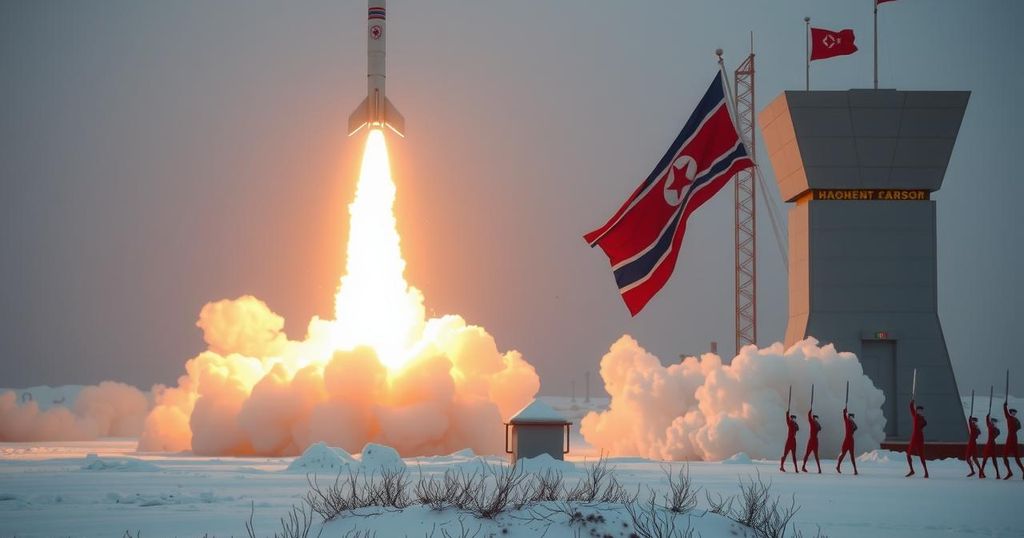North Korea fired a missile as U.S. Secretary of State Antony Blinken visited South Korea, raising concerns over Pyongyang’s increasing ties with Russia on advanced technologies. The missile launch came amid internal political turmoil in South Korea, with Blinken reaffirming support for democratic institutions and emphasizing the importance of trilateral cooperation among the U.S., South Korea, and Japan to address North Korean threats.
On Monday, North Korea launched a missile coinciding with the visit of U.S. Secretary of State Antony Blinken to South Korea, where he expressed concerns regarding North Korea’s increasing collaboration with Russia in advanced space technologies. Blinken’s visit follows the impeachment of conservative President Yoon Suk Yeol, who has sought refuge at the presidential residence. Despite this, Blinken aimed to promote South Korea’s continued partnership with Japan during his discussions. The ballistic missile reportedly traveled approximately 1,100 kilometers before landing in the sea.
During a joint conference with South Korean Foreign Minister Cho Tae-yul, Blinken characterized the missile launch as a critical reminder of the need for intensified cooperation among the U.S., South Korea, and Japan against growing North Korean threats. He conveyed his worries that Russia is bolstering its military support for North Korea, indicating that this alliance may include the exchange of advanced space and satellite technologies. Furthermore, he expressed fears that Russia’s actions could result in formal acknowledgment of North Korea as a nuclear state, undermining global efforts to disarm Pyongyang.
The recent missile test occurred just two weeks prior to the inauguration of President-elect Donald Trump, who previously sought to engage North Korea through unprecedented diplomatic efforts. Blinken defended the Biden administration’s approach to North Korea, asserting that their initiatives for engagement have only prompted increased provocations from Pyongyang. This visit coincidentally fell on the anniversary of the January 6 Capitol riot, with tensions surrounding President Yoon’s administration still present. Blinken refrained from commenting on Yoon’s political challenges but reaffirmed U.S. support for South Korea’s democratic institutions.
In discussions with acting President Choi Sang-mok, Blinken confirmed the U.S. commitment to the collaborative principles established during the Camp David summit. Despite the pressure from South Korea’s progressive opposition, which leans towards diplomatic engagement with North Korea, Yoon’s administration remains resolute in its foreign policy direction. The Biden administration continues to value the U.S.-South Korea alliance and urges collaborative efforts to tackle the burgeoning threats posed by North Korea, particularly in light of its evolving ties with Russia.
In summary, Blinken’s visit underscored the persistent threats posed by North Korea amid evolving geopolitical dynamics, particularly its alliance with Russia and the implications of such a partnership on global nuclear non-proliferation efforts. The U.S. remains committed to supporting South Korea while urging continued cooperation among allied nations in addressing these formidable challenges.
The article highlights the geopolitical tensions surrounding North Korea’s missile tests and its increasing cooperation with Russia in advanced technologies. Secretary of State Antony Blinken’s visit to South Korea occurs against the backdrop of the impeachment of President Yoon Suk Yeol, reflecting internal political struggles. The broader implications of North Korea’s actions on international relations, particularly regarding nuclear proliferation and military alliances, form a core theme throughout the discussion. As the U.S. navigates its foreign policy strategies, the engagement with North Korea remains critical amidst calls for diplomatic processes over military tensions.
In conclusion, the missile launch by North Korea during Secretary Blinken’s visit to South Korea serves as a stark reminder of the volatile security landscape in East Asia. The growing collaboration between North Korea and Russia raises serious concerns about military support and nuclear proliferation. The Biden administration continues to advocate for a diplomatic approach while reaffirming its commitment to allied nations. As tensions escalate, the importance of cooperation among the U.S., South Korea, and Japan becomes increasingly evident, necessitating a unified front against North Korean provocations.
Original Source: www.dawn.com






